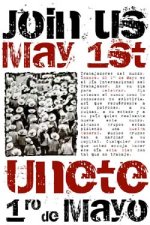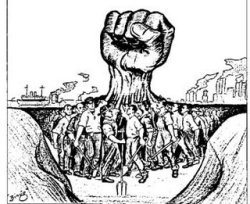Let us sink such differences as nationality, religion, politics, and set our eyes eternally and forever toward the rising star of the industrial republic of labor; remembering that we have left the old behind and have set our faces toward the future. There is no power on earth that can stop men and women who are determined to be free at all hazards. There is no power on earth so great as the power of intellect. It moves the world and it moves the earth.
— Lucy Parsons (1905): Speech to the Industrial Workers of the World
From last year’s commemorative post:
Today is May Day, or International Worker’s Day: a day to celebrate the long, hard struggle of workers for freedom, self-determination, and a better life. The day originated during the heady days of the Eight Hour Day campaign in the late 19th century, a campaign led not by bureaucratic union bosses, much less by Marxist thugs, but by ordinary workers agitating and organizing amongst themselves. Most of them were anarchists, and their struggle was as much against State power as it was against the bosses (part of the reason for May Day commemorations, mind you, is to remember the Haymarket martyrs, anarchists murdered by the state of Illinois).
— GT 2005-05-01: May Day, May Day
From Kevin Carson’s commemorative post from last year:
May Day, the international holiday of the socialist and workers’ movements, is popularly viewed in the U.S. as that commie holiday.
It’s commonly associated with big parades and displays of military hardware on Red Square, and exchanges of fraternal greetings
between leaders of the USSR and its satellites.
In fact, though, it’s a holiday that started in the U.S., and is as American as apple pie. In 1884, the Federation of Organized Trades and Labor Unions, predecessor of the AFL, called for a nationwide general strike in favor of the eight-hour day. It was to be introduced on May 1, 1886. The political strife resulting directly from that movement included the Haymarket bomb and the subsequent police and judicial riot. The celebration of May Day as a worker’s holiday dates back to that movement.
The foreign and communist associations of May Day, in the popular mind, are in large part the outcome of an elite propaganda campaign in the U.S. U.S. ruling circles attempted to identify the assorted workers’ and populist movements, in popular consciousness, with foreign radicalism, “unAmericanism,” and “Red Ruin.” This campaign finally paid off in the War Hysteria and subsequent Red Scare of the Wilson administration, which was used as an opportunity to suppress (via mass arrests, criminal syndicalism
laws, etc.) organizations as diverse as the I.W.W., the Non-Partisan League, and the Farmer-Labor Party. Thanks to the war propaganda, the Palmer Raids and the quasi-private vigilantism of groups like the American Legion, socialism largely ceased to exist as a mass-based movement in the U.S. Around the same time, Congress designated May 1 as Loyalty Day.
— Kevin Carson, Mutualist Blog (2005-04-29): May Day Thoughts: Individualist Anarchism and the Labor Movement
Which is not to say that the Bolsheviks and the business unionists weren’t more than happy to play along, and lay claim to this day (and labor radicalism as a whole) as if it were their idea, or their rightful heritage. Hell, the pro-government trade union
bosses and the nostalgic
apparatchiks
are still using it to mill about in public, longing for the good old days of tanks and commissars and ballistic missiles hauled down the street:
MOSCOW (AFP) — Tens of thousands of people marched through central Moscow on Monday to celebrate May Day in peaceful demonstrations organized by pro-government trade unions and Communists nostalgic for Soviet times.
About 25,000 trade union members called for a social state,
holding balloons and flowers, according to police spokesman, Viktor Biryukov, quoted by ITAR-TASS news agency.
Several thousand Communist Party supporters also marched from the Lenin monument on October Square to a bust of Karl Marx near Red Square, carrying red flags and portraits of Stalin, an AFP reporter at the march said.
— USA Today (2006-05-01): Trade unions, Communists march through Moscow on May Day
We know, or if we don’t know we damned well should by now, what the Bolshevik cannibal-empire really meant for trade unions and for ordinary workers. To hell with that, and to hell with any holiday that celebrates it. But we also know, or if we damned well should by now, that this holiday isn’t theirs to ruin. As I said last year:
One of the (many) crimes of the state socialists in the 20th century was their wholesale theft of May Day; what had been and properly remains a day for celebrating the free actions of ordinary workers became, in the bloody talons of the so-called workers’ states
, a day for celebrating socialist
God-Kings and hideous parades of military power. The folks over at Catallarchy have gone so far as to name May Day a Day of Remembrance for the victims of state Communism. What they are doing is important. The Moloch of Marxist-Leninism consumed more victims than any other power that the world has known in history–through mass executions, through unbelievable mass starvation, through pestilence, through death camps, through war. History is important and memory is political; the stories are harrowing but they need to be told. But I do not think that May Day is the day for the solemn observations. I think that this gives the butchers too much credit. Marxist-Leninism stole May Day from anarchists, from workers, like it stole everything else it ever gained in the 20th century. It did its best to silence its victims, like it did to silence all its other victims, with a bullet to the head and piles of pirated loot to parties and unions that would toe the Bolshevik line. I will not give up May Day to them any more than I will give Juneteenth up to William Tecumseh Sherman or give Easter up to the Holy Inquisition. (If you’re looking for a day of remembrance, I’d suggest the 6th of March, the day that the Kronstadt massacre began.) But today is the International Workers’ Day, not the State’s day–meaning neither the bureaucratic-managerial state so beloved of the conservative AFL-line unions, nor the blood-soaked workers’ states
(a contradiction in terms).
— GT 2005-05-01: May Day, May Day

May Day is and ought to be a Day of Resistance, of defiance against the arrogance and exploitation of the bosses — whether corporate or political. A day to celebrate workers’ struggles for dignity, and for freedom, through organizing in their own self-interest, through agitating and exhorting for solidarity, and through free acts of worker-led direct action to achieve their goals. So what a real joy it is to see May Day 2006 honored through general strikes across the country, demanding freedom and respect for immigrant workers:
It is being billed as The Great American Boycott 2006. Tomorrow, international labour day in the US, thousands or perhaps millions of people are expected to join in a nationwide boycott to protest against proposals that would toughen existing immigration laws.
Under the slogan No work, no school, no sales, no buying
, the boycott will be accompanied by marches and protests across the country. Organisers hope that it will build on the unexpected scale of the anti-immigration reform protest held at the end of March, which saw around half a million people take to the streets of Los Angeles and helped push the immigration debate to the top of the political agenda.
Protesters have been galvanised by the passage of a bill in the House of Representatives in December that focused on tougher restrictions on illegal immigrants without offering any route to legality.
Today’s protests will include events in 72 American cities, 25 of them in California, as well as Mexico, where a boycott of US goods and services is planned. Subcomandante Marcos and his Zapatista rebel movement have promised to hold a rally outside the US embassy in Mexico City.
The biggest US demonstrations are expected to take place in New York, Chicago — where estimates suggest that around 300,000 people will turn out — and Los Angeles, where two demonstrations are planned, each of which could attract 500,000 people, according to police estimates.
— The Guardian (2006-05-01): US protesters stage one-day boycott over immigrant bill
From FOX40 KTXL in Sacramento:
We’re here to make a statement,
said Catalina Hernandez, an environmental specialist who brought her niece and nephew to one of the Los Angeles marches. All these people didn’t just appear here overnight. We’ve been here all this time.
Many of the demonstrators were like Juana Teresa Kouyoumdjian, 35, who by 5 p.m. had spent eight hours marching through Los Angeles with her brother, Enrique Orellana, 36, and still faced a long trek back downtown to their car.
Quitting wasn’t an option because I want to fight to the very end,
said Kouyoumdjian, who is now legal after illegally coming to the United States from El Salvador 16 years ago.
The boycott’s economic power was evident at the Los Angeles and Long Beach harbors, where despite being the nation’s largest port complex few trucks were rolling. In all, traffic was off 90 percent, said Theresa Adams Lopez, spokeswoman for the Port of Los Angeles.
… In California’s agricultural heartland, immigrant farmworkers took the day off to march and rally in towns throughout the San Joaquin Valley.
Several hundred farmworkers marched in downtown Porterville, 70 miles southeast of Fresno, waving American flags. Outside town, groves still holding some of the winter’s orange crop were empty of workers.
We’ve got to help all the people living here without papers,
said Samuel Jimenez, 54, a Mexican farmworker who lives Porterville.
— FOX 40 KTXL-TV Sacramento (2006-05-01): Immigration Rallies Draw Thousands

Chicago, May Day 2006
From the Associated Press, via Forbes online:
More than 1 million mostly Hispanic immigrants and their supporters skipped work and took to the streets Monday, flexing their economic muscle in a nationwide boycott that succeeded in slowing or shutting many farms, factories, markets and restaurants.
From Los Angeles to Chicago, Houston to Miami, the Day Without Immigrants
attracted widespread participation despite divisions among activists over whether a boycott would send the right message to Washington lawmakers considering sweeping immigration reform.
We are the backbone of what America is, legal or illegal, it doesn’t matter,
said Melanie Lugo, who with her husband and their third-grade daughter joined a rally of some 75,000 in Denver. We butter each other’s bread. They need us as much as we need them.
Two major rallies in Los Angeles attracted an estimated 400,000, according to the mayor’s office. Police in Chicago estimated 400,000 people marched through the downtown business district.
Tens of thousands more marched in New York, along with about 15,000 in Houston, 50,000 in San Jose and 30,000 more across Florida. Smaller rallies in cities from Pennsylvania and Connecticut to Arizona and South Dakota attracted hundreds not thousands.
In all, police departments in more than two dozen U.S. cities contacted by The Associated Press gave crowd estimates that totaled about 1.1 million marchers.
The mood was jubilant. Marchers standing shoulder-to-shoulder filmed themselves on home video and families sang and chanted and danced in the streets wearing American flags as capes and bandanas. In most cities, those who rallied wore white to signify peace and solidarity.
In Los Angeles, the city streets were a carpet of undulating white that stretched for several miles, with palm trees and grass-covered medians poking through a sea of humanity. Marchers holding U.S. flags aloft sang the national anthem in English as traditional Mexican dancers wove through the crowd.
In Chicago, illegal immigrants from Ireland and Poland marched alongside Hispanics as office workers on lunch breaks clapped. In Phoenix, protesters formed a human chain in front of Wal-Mart and Home Depot stores. Protesters in Tijuana, Mexico, blocked vehicle traffic heading to San Diego at the world’s busiest border crossing.
Many carried signs in Spanish that translated to We are America
and Today we march, tomorrow we vote.
Others waved Mexican flags or wore hats and scarves from their native countries. Some chanted USA
while others shouted slogans, such as Si se puede!
Spanish for Yes, it can be done!
Others were more irreverent, wearing T-shirts that read I’m illegal. So what?
— Gillian Flaccus, Forbes.com (2006-05-01): Update 26: 1M Immigrants Skip Work for Demonstration
Immigration creeps have mostly been muted today, but this is driving them up the wall, because they knowexactly what it means:
Make no mistake. This day is about confrontation, intimidation, and extortion. No American, no person who hopes to be an American, should embrace an action that has criminals demanding that their law breaking be overlooked and even celebrated.
–Kleinheider, Volunteer Voter
weblog, quoted by david, the view from below (2006-05-01): Immigrant Action Reaction
Of course, there’s no actual extortion
involved in refusing to work for a day; workers are not your servants, not even immigrant workers, and declining to freely give their work for a day is not forcing you to give up anything that was yours to begin with. But you’re damned right that this is about confrontation, and you’re damned right that it’s about defying the law.
You express a great deal of anxiety over our willingness to break laws. This is certainly a legitimate concern. … One may well ask: How can you advocate breaking some laws and obeying others?
The answer is found in the fact that there are two types of laws: There are just and there are unjust laws. I would be the first to advocate obeying just laws. One has not only a legal but a moral responsibility to obey just laws. Conversely, one has a moral responsibility to disobey unjust laws. I would agree with Saint Augustine that An unjust law is no law at all.
— Martin Luther King Jr. (1963-04-16): Letter from Birmingham Jail
And it is an unjust law: neither you nor the government has any right to commandeer the lives and livelihoods of innocent workers to satisfy your Law-and-Order hang-ups, or your theo-national power trip.
But this is ultimately beside the point anyway. Even if failing to learn English was a dreadful threat to the prospects of liberty; even if not celebrating Veterans’ Day or Flag Day or Arbor Day were an ominous step towards totalitarianism, it would provide absolutely no justification whatever for using force to stop people from traveling to property where they are welcomed by the owner (either out of hospitality, or because they pay rent, or because they are prepared to buy it for themselves). Certain kinds of bad thoughts may very well be corrosive to liberty, but there’s no libertarian justification in restraining, beating, shooting, detaining,
jailing, or exiling somebody just for having bad thoughts. Neither you nor the government has any right to force people off of property onto which they have been invited, even if you think that their presence is a looming danger to the future of liberty in America, unless they have actually done or threatened real violence to somebody else. Vices are not crimes, and only crimes can justly be resisted by force.
— GT 2006-03-31: Libertarians Against Property Rights: You Will Be Assimilated
Edition
What we are witnessing today, and have been witnessing for the past few weeks, is nothing less than an explosively growing freedom movement. A freedom movement bringing millions into the streets, bringing together labor militancy and internationalism. And it is being done in defiance of the violence of La Migra, the bullying bigotry of the nativist creeps, and the condescending hand-wringing of the sympathetic
politicos. It is exactly what May Day was made for. And exactly what the kind of creeps behind the Loyalty Days
of the world — whether state-communist or state-capitalist — fear the most: ordinary people standing together, celebrating together, free, happy, irreverant, and unafraid.
There will be a time when our silence will be more powerful than the voices you strangle today!
–Last words of August Spies (1887-11-11), immigrant, anarchist, and Haymarket martyr
Happy May Day.
Past commemorations
Further reading: immigration and events today
Further reading: the meaning of May Day
Further reading: from Geekery Today


